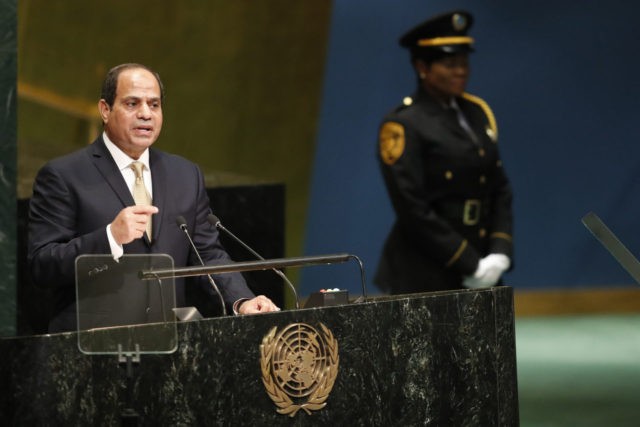NEW YORK – Egyptian media leaders and distinguished members of the Egyptian parliament met with members of the American media and foreign policy community Tuesday to discuss how to mend the relationship between the United States and Egypt.
The Obama administration has been reluctant to accept the legitimacy of President Abdel Fattah al-Sisi after he assumed power following the removal of his Muslim Brotherhood predecessor, Mohamed Morsi.
Popular Egyptian media personality and host of American Pulse, Dr. Michael Morgan, organized the event, featuring several American foreign policy experts, including representatives from the London Center for Policy Research. The event gave these foreign policy experts a chance to meet with over one hundred prominent Egyptians, including members of parliament, leading media figures, government officials, and businessmen.
“The dinner was in honor of Egypt the country, and to try to strengthen the relationship between the Egyptians and Americans,” Dr. Morgan said. “After the downfall that has happened over the last eight years between the United States and Egypt [during] Barack Obama’s presidency, we hope that America will turn it’s face back to Egypt.”
Event organizers provided Breitbart News with unrestricted, on-the-record access to participate in the dialogue on a wide range of issues, including the ramifications of the United States presidential election on America’s relationship with Egypt, challenges in the Middle East, and the Egyptian government’s efforts to maintain peace and stability after more than five years of turmoil.
Members of the Egyptian delegation lambasted Hillary Clinton, a major figure in the demise of U.S.-Egyptian relations, after Egyptian President El-Sisi met with both Clinton and Republican presidential nominee Donald Trump on Monday.
London Center for Policy Research Vice President of Strategic Initiatives and Operations Tony Shaffer argued that Egypt is critical to any solution addressing current conflicts in the Middle East. Shaffer and the London Center for Policy Research have proposed the formation of an “Arab NATO,” led by Egypt and Egyptian President El-Sisi. The concept would use Egyptian credibility and respect from both Western and Muslim countries to bring together a coalition of Arab nations to enforce borders and settle disputes in the Middle East.
For the past five years, Egypt’s diplomatic relationship with the U.S. has been significantly strained.
In 2011, Egyptian protesters successfully deposed President Hosni Mubarak following three decades of rule. After Mubarak’s removal, the Muslim Brotherhood’s Mohamed Morsi became president and began to implement hardline Islamist policies. Under Morsi and the Brotherhood, Egypt’s government began to increasingly behave like an oppressive Islamist theocracy. Then-Secretary of State Hillary Clinton paid Morsi an official visit, lending legitimacy to the Muslim Brotherhood regime.
In 2013, millions of Egyptians again took to the streets to protest the tyranny of the Muslim Brotherhood and President Morsi. The Egyptian military, led by General Abdel Fattah El-Sisi, stepped in to remove Morsi and the Muslim Brotherhood. Violence broke out as the Muslim Brotherhood clashed with the military for control of the country. President Obama took the side of the hardline Islamists, ordering a review of U.S. aid to Egypt and canceling joint military exercises between the two countries over the removal of Morsi and the resulting violence. At the time, Obama was quoted as saying, “while we want to sustain our relationship with Egypt, our traditional cooperation cannot continue as usual…”
General El-Sisi blasted the actions of the Obama administration in an interview with the Washington Post saying, “You left the Egyptians. You turned your back on the Egyptians, and they won’t forget that.”
In 2014, General El-Sisi was elected President and began the difficult process of restoring order to a country reeling from years of political upheaval. President El-Sisi’s government has drafted and adopted a new constitution, cracked down on radical Islamist terrorism in Egypt and around the world, and formed a diverse and inclusive government that should be a natural ally of the United States. The way the Obama administration and Hillary Clinton’s State Department acted during the Egyptian political upheaval and refusal to designate the Muslim Brotherhood as a terrorist organization, however, has badly strained the countries’ relationship.
In 2015, President El-Sisi called for a “religious revolution” from inside Islam to destroy “extremism.”
Members of the Egyptian delegation were hopeful that President Obama’s replacement could open the door to closer collaboration between the two natural allies.
Dustin Stockton is a political reporter for Breitbart News, a community liaison for Gun Owners of America, and a political strategist. Follow him on Twitter @DustinStockton or Facebook.

COMMENTS
Please let us know if you're having issues with commenting.